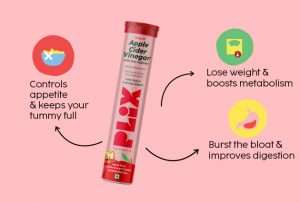The Probiotics Myth & The Truth about the Benefits of this Essential Gut-Sustaining Substance

Probiotics are live strains of “good” bacteria that help the body maintain its health. They’re naturally found in foods like yoghurt, kefir, sauerkraut, kimchi, and pickled vegetables, as supplements, and increasingly as additives in a variety of functional food and beverage products. What exactly are probiotics?
How does ‘probiotics’ work?
These microbes can replicate once they reach an appropriate host environment. In general, probiotics require a moist environment to survive. However, in the case of supplements, if the bacteria are properly stabilised and dried, they remain alive and can begin to grow and replicate again once returned to a moist environment (in this case, in your body). When you take probiotics, you are essentially repopulating the gut with the healthy bacteria it requires to maintain a balanced microbiome (the collection of microbes that lives in and on the human body).
Probiotic tablets use
Because a lack of sleep, antibiotics, stress, travel or a poor diet can upset the microbiome, probiotics can be beneficial for many people. Because the intestines are home to trillions of bacterial cells, not all of which are friendly, incorporating probiotic-rich foods or supplements into the diet can result in improved digestive health. Probiotics are also beneficial to immune health because the intestines contain approximately 70% of the body’s innate immune function. Scientists are increasingly connecting microbial balance to body-wide benefits ranging from heart health to mental health.
What can negatively affect gut bacteria?
A variety of factors, including smoking and high-stress levels, as well as antibiotic use, have been shown to have a negative impact on gut bacteria. Antibiotics, which are used to treat infections, reduce and deplete the natural bacteria in the gut. Antibiotic resistance is becoming a serious problem around the world, so we should only use them when absolutely necessary. Stress can alter the number and diversity of bacteria in our gut, affecting the immune system and possibly explaining why certain conditions, such as eczema or acne, flare up when we are stressed.
Excessive alcohol consumption can be inflammatory and can harm the lining of our digestive system, which is home to a large portion of our microbiome, reducing their numbers and thus affecting our health. In addition to the well-documented health risks, smoking has a negative impact on the bacterial composition of the gut.
Myths about Probiotics
1. All Yogurts and Fermented Foods Have Probiotics
While many fermented foods, such as yoghurt and sauerkraut, can be good sources of probiotic bacteria, not all of them are effective substitutes for supplements. They might have the wrong bacteria, or those bacteria might not survive digestion long enough to provide any long-term benefit. For example, while some yoghurts are high in probiotics, others are often deficient. This is because the bacteria used to ferment milk into yoghurt aren’t always compatible with the human digestive system, which means they may die off before reaching the gut. The pasteurisation process may also harm certain types of beneficial bacteria, making these yoghurts less effective at improving gut health.
2. Probiotics Are Ineffective if You’re Taking Antibiotics
Another common misconception is that probiotics are useless if you are currently taking antibiotics. However, the opposite is true: probiotic supplements may be more important than ever when taking antibiotics. This is because antibiotics kill both good and bad bacteria, resulting in a depleted gut microbiome that must be replenished. Furthermore, probiotics have been shown to mitigate some of the negative effects of antibiotic therapy. For example, one study discovered that the probiotic strain Lactobacillus GG reduced the incidence of antibiotic-related diarrhoea in children, demonstrating its potential as an effective way to counteract some of these treatments’ negative side effects.
3. If You Take Probiotics Too Long, Your Body Will Get Used to Them
While it is true that your body may require some time to adjust to higher levels of probiotics in your gut, the notion that they will become less effective over time is based on a misunderstanding of what these supplements are. Probiotics are not medications, and as such, your body will not develop resistance to them. They are microbes that are supposed to be in your body’s digestive system and are essential for gut health. As a result, it is extremely difficult to overdose on probiotics.
4. If You Take Prebiotics, You Don’t Need Probiotics
If you don’t have enough probiotics in your gut, prebiotics—substances like dietary fibre that feed beneficial bacteria—can help. However, it is much slower than using probiotics and may even be insufficient if your gut is out of balance. Too many harmful bacteria can make rebalancing your gut microbiome with prebiotics much more difficult. Probiotics can help combat harmful bacteria strains and restore proper gut health faster. Furthermore, probiotics and prebiotics work far better together than either alone. According to research, prebiotics and probiotics work together to produce a far greater effect than either could achieve on their own.
5. Healthy People Don’t Need Probiotic Supplements
One of the probiotic myth is that probiotic supplements are only necessary if you have gut-related health issues. This is simply not true, given that people are exposed to toxic chemicals on a daily basis. The average American diet contains highly processed foods that disrupt the gut microbiome, and this disruption is not always obvious. Your diet is most likely affecting the ratio of good to bad bacteria in your gut. According to research, probiotics are “crucial for the maintenance of balance of human intestinal microbiota,” so it’s important to maintain a healthy balance even if you’re feeling fine right now.
Plix Life is a Mumbai-based company that has mastered the art of delivering good health in the most palatable way. Happy Tummy – Pre+Probiotics and Probiotic+ Apple Cider Vinegar are products from Plix that can help you get better at your gut game!
Probiotics health benefits
1. Optimize Gut Function by Balancing the Bacteria in Your Digestive System
Maintaining a balanced gut microbiome allows for normal gut function, whereas changes in gut bacteria can cause problems. Probiotics can help maintain a healthy balance of bacteria in the gut and help the microbiome repopulate after conditions disrupt the microbiome. Antibiotics, for example, kill off many of your good gut bacteria. This allows bad bacteria, viruses, and fungi to proliferate. Taking a probiotic before and after antibiotics is essential for long-term health.
2. Reduce Gas and Bloating
Bloating and gas are common digestive issues. An imbalance in your gut microbiome, yeast overgrowth, and food intolerances are all possible causes of gas and bloating. It may also be an indication of a more serious condition, such as IBS. Probiotic supplements can assist in rebalancing the gut microbiome and even crowd out harmful bacteria. Some evidence suggests that probiotics may help reduce these symptoms, particularly in people who suffer from digestive disorders such as IBS.
3. Boost the Immune System and Speed Recovery from Illness
During illness, the bacteria in the gut are frequently out of balance, particularly if you have a stomach virus, food poisoning, or have had to take antibiotics. Probiotics replenish your gut flora with beneficial bacteria and can aid in immune system balance.
If you’re looking for probiotic solutions for improving immunity and overall health, you should check out Plix’s Probiotic+ Apple Cider Vinegar products from Plix that can help you get better at your gut game!
FAQs
1. How should I consume a probiotic supplement?
You can consume probiotics in several ways. They are found in a variety of forms, including foods, drinks, pills or capsules, powders, and liquids.
2. Are probiotics safe to be consumed?
Probiotic foods and supplements are generally considered safe because the microbes used as probiotics already exist naturally in your body. They may cause allergic reactions, as well as mild stomach upset, diarrhea, flatulence, and bloating in the first few days of use.
Certain people should exercise caution when taking probiotic supplements.
3. How are probiotics different from prebiotics?
Probiotics promote the growth of beneficial bacteria, which improves gut health. Prebiotics, on the other hand, nourish beneficial bacteria. In addition to their applications, probiotics and prebiotics have mutual benefits. The health benefits of Pre and Probiotics are combined in Plix Good Gut.
4. What Are The Benefits Of Apple Cider Vinegar in Plix Probiotic+ Apple Cider Vinegar?
This product contains apple cider vinegar, which has numerous health benefits. Some of the advantages of Apple Cider Vinegar (ACV) include healthy weight loss, increased metabolism, and appetite control. It also aids in blood sugar regulation and cardiovascular health.
5. How does it taste and smell?
It is devoid of any bad or pungent smell. As far as the taste is concerned, it tastes great and smells like a fresh apple!














